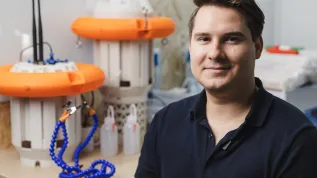
Dr. Artur Obłuski from the Polish Centre of Mediterranean Archaeology of the University of Warsaw was the Public's Choice in the European Research Council's Public Engagement with Research Award competition. The competition winners were announced last week.
The Public Engagement with Research Award is granted to ERC grant winners who have demonstrated excellence in engaging with communities beyond the world of science during their projects.
One of this year’s nine finalists, Dr. Artur Obłuski was nominated in the Inspire - public outreach category.
The winners in each of the three categories, announced during the Euroscience Open Forum 2022, were: Alpa Shah from the London School of Economics and Political Science, Jonathan Tennyson from University College London and Mariska Kret from the University of Leiden. Dr. Artur Obłuski won the Public's Choice award decided by social media voting.
Dr. Artur Obłuski's ERC-financed project 'UMMA - Urban Metamorphosis of the community of a Medieval African capital city' is carried out in Old Dongola, Sudan.
Dr. Obłuski said: “Old Dongola, where the remains of magnificent churches, monasteries with the largest collection of medieval paintings in the world, or the oldest surviving mosque in Sudan and monumental tombs of sheikhs (Islamic spiritual leaders) have been preserved, is a vital feature of world cultural heritage. This potential should not only benefit the archaeologists excavating there, but also local communities and Sudanese society more generally.”
He added that his team, together with local communities as well as local and regional governments and central authorities, has initiated efforts to take a strategic approach to the heritage preserved at the site.
He said: “This is so that our hosts, in addition to the splendour, will also have more tangible benefits, e.g. economic gains as part of sustainable development, the benefits which will go to local communities and not to large corporations. Remember that Sudan is the 8th poorest country in the world.”
A new strategy in the PCMA UW research includes collaboration with local communities for the purposes of archaeology, heritage and sustainable development.
This approach aims to promote a closer relationship between researchers and the people living in the regions where the research is carried out and “allows archaeological results to be embedded in their social and geographical contexts,” Obłuski said.
The implementation of the strategy in Old Dongola is coordinated by Dr. Tomomi Fushiya, who specialises in collaborative archaeology and has been working on similar projects in Sudan for years.
Obłuski and Fushiya emphasise that work on an archaeological project should be conducted in a bilateral way, taking into account the local point of view and traditional knowledge of cultural heritage.
Such a participatory approach, involving contemporary societies, enables a truly two-way collaboration and can contribute to the decolonisation of the methods used in archaeology in Sudan.
PAP - Science in Poland
ekr/ kap/
tr. RL













